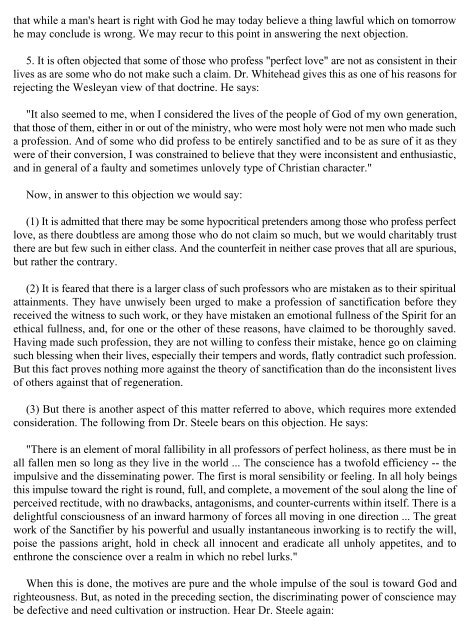Scriptural Sanctification - Media Sabda Org
Scriptural Sanctification - Media Sabda Org
Scriptural Sanctification - Media Sabda Org
You also want an ePaper? Increase the reach of your titles
YUMPU automatically turns print PDFs into web optimized ePapers that Google loves.
that while a man's heart is right with God he may today believe a thing lawful which on tomorrow<br />
he may conclude is wrong. We may recur to this point in answering the next objection.<br />
5. It is often objected that some of those who profess "perfect love" are not as consistent in their<br />
lives as are some who do not make such a claim. Dr. Whitehead gives this as one of his reasons for<br />
rejecting the Wesleyan view of that doctrine. He says:<br />
"It also seemed to me, when I considered the lives of the people of God of my own generation,<br />
that those of them, either in or out of the ministry, who were most holy were not men who made such<br />
a profession. And of some who did profess to be entirely sanctified and to be as sure of it as they<br />
were of their conversion, I was constrained to believe that they were inconsistent and enthusiastic,<br />
and in general of a faulty and sometimes unlovely type of Christian character."<br />
Now, in answer to this objection we would say:<br />
(1) It is admitted that there may be some hypocritical pretenders among those who profess perfect<br />
love, as there doubtless are among those who do not claim so much, but we would charitably trust<br />
there are but few such in either class. And the counterfeit in neither case proves that all are spurious,<br />
but rather the contrary.<br />
(2) It is feared that there is a larger class of such professors who are mistaken as to their spiritual<br />
attainments. They have unwisely been urged to make a profession of sanctification before they<br />
received the witness to such work, or they have mistaken an emotional fullness of the Spirit for an<br />
ethical fullness, and, for one or the other of these reasons, have claimed to be thoroughly saved.<br />
Having made such profession, they are not willing to confess their mistake, hence go on claiming<br />
such blessing when their lives, especially their tempers and words, flatly contradict such profession.<br />
But this fact proves nothing more against the theory of sanctification than do the inconsistent lives<br />
of others against that of regeneration.<br />
(3) But there is another aspect of this matter referred to above, which requires more extended<br />
consideration. The following from Dr. Steele bears on this objection. He says:<br />
"There is an element of moral fallibility in all professors of perfect holiness, as there must be in<br />
all fallen men so long as they live in the world ... The conscience has a twofold efficiency -- the<br />
impulsive and the disseminating power. The first is moral sensibility or feeling. In all holy beings<br />
this impulse toward the right is round, full, and complete, a movement of the soul along the line of<br />
perceived rectitude, with no drawbacks, antagonisms, and counter-currents within itself. There is a<br />
delightful consciousness of an inward harmony of forces all moving in one direction ... The great<br />
work of the Sanctifier by his powerful and usually instantaneous inworking is to rectify the will,<br />
poise the passions aright, hold in check all innocent and eradicate all unholy appetites, and to<br />
enthrone the conscience over a realm in which no rebel lurks."<br />
When this is done, the motives are pure and the whole impulse of the soul is toward God and<br />
righteousness. But, as noted in the preceding section, the discriminating power of conscience may<br />
be defective and need cultivation or instruction. Hear Dr. Steele again:
















